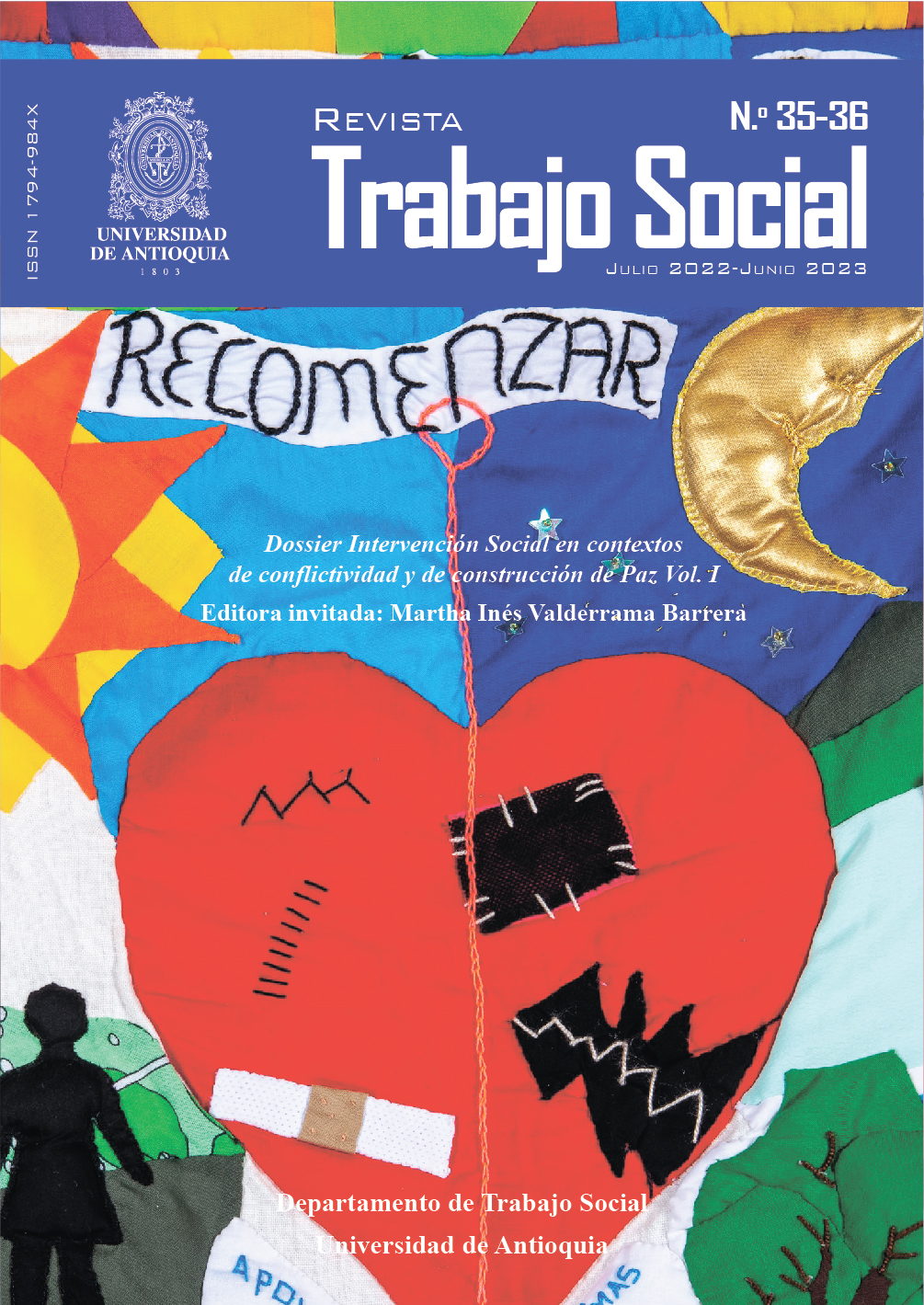Del trauma colectivo al carácter colectivo de la reconciliación. La experiencia de mujeres pertenecientes a un centro comunitario en la ciudad de Medellín-Colombia
Palavras-chave:
Trauma Colectivo, Reconciliación, Mujeres, Victimización, Conflicto ArmadoResumo
El objetivo de este trabajo es comprender el trauma colectivo asociado a la victimización de un grupo de mujeres en el contexto del conflicto armado en Colombia, y la construcción de reconciliación desde los procesos colectivos de los que participan en un centro comunitario de la ciudad de Medellín-Colombia. El estudio, fundamentado en el interaccionismo simbólico, se llevó a cabo a través de una estrategia de estudio de caso intrínseco en el que se abordaron las experiencias de estas mujeres a través de talleres investigativos y entrevistas semiestructuradas. En este estudio se detallan hallazgos relacionados con las formas de victimización de las mujeres participantes, su comprensión de la reconciliación como proceso y la manera en que han transitado de un trauma colectivo a una reconciliación construida colectivamente. Este estudio evidencia la importancia de que estas mujeres cuenten con espacios comunitarios para tramitar colectivamente, a través del diálogo, el acompañamiento colectivo y las prácticas sociales, las afectaciones por las violencias padecidas, para que puedan proyectar hacia el futuro procesos de reconciliación social y subjetiva, buscando el fortalecimiento de los lazos con otros(as), para contribuir a la paz social y, en muchos casos, al perdón desde una dimensión personal.
Downloads
Referências
Amorós, C. (2008). Mujeres e imaginarios de la globalización. Homo Sapiens.
Arendt, H. (2005). Comprensión y política. Las dificultades de la comprensión. En H. Arendt, Ensayos de comprensión (pp. 395-434). Caparrós.
Bennett, J. & Kayetisi-Blewitt, M. (1996). Beyond “Working in Conflict”: Understanding con-flict and building peace. Network Paper, 18. https://www.files.ethz.ch/isn/97827/networkpa-per018.pdf
Blumer, H. (1982). El interaccionismo Simbólico: Perspectiva y Método. HORA, S.A.
Castañeda, A. & Vargas, J. F. (2014). Hitos del conflicto y riesgo país. En A. Ibañez & D. Mejía (comp.), Costos económicos y sociales del conflicto en Colombia: ¿Cómo construir un poscon-flicto sostenible? (pp. 239-272). Ediciones Uniandes.
Cuchumbé-Holguín, N. J. & Vargas-Bejarano, J. C. (2008). Reflexiones sobre el sentido y génesis del desplazamiento forzado en Colombia. Universitas humanística, 65, 173-196.
De la Rey, C. (2001). Reconciliation in Divided Societies. En D. J. Christie, R. V. Wagner & D. A. Winter (eds.), Peace, conflict, and violence: Peace psychology for the 21st century (pp. 251-261). Prentice-Hall.
Díaz, F. (2007). Trauma colectivo y terrorismo. Umbral Científico, 10, 133-148.
Femenías, M. L. & Soza, P. (2009). Poder y violencia sobre el cuerpo de las mujeres. Sociologías,11(21), 42-65.
Galeano, M. E. (2004). Diseño de proyectos en la investigación cualitativa. Editorial EAFIT.Garrido-Rodríguez, E. (2008). El perdón en procesos de reconciliación: el mecanismo micropolíti-co del aprendizaje para la convivencia. Papel político, 13(1), 123-167.
Lederach, J. P. (1998). Construyendo la paz: Reconciliación sostenible en sociedades diversas. Bakeaz.
Murillo, E. (2012). Hacia una política pública de reconciliación social: tipología y casos. Papel político, 17(2), 423-467.
Murillo, E. (2017). Reconciliación social como política pública: Sudáfrica, El Salvador, Nicaragua y Colombia. Pontificia Universidad Javeriana.
Páramo, P. (ed.). (2011). La investigación en ciencias sociales: estrategias de investigación. Uni-versidad Piloto de Colombia.
Pérez-Sales, P. & Fernández-Liria, A. (2015). Trauma: del apoyo psicosocial a la psicoterapia. Guía de procesos y programa de intervención desde una perspectiva comunitaria. Irredentos libros.
Segato, R. L. (2014). Las nuevas formas de la guerra y el cuerpo de las mujeres. Sociedade e Es-tado, 29(2), 341-371.
Strauss, A. & Corbin, J. (2002). Bases de la investigación cualitativa. Técnicas y procedimientos para desarrollar la teoría. Editorial Universidad de Antioquia.
Unidad para la Atención y Reparación Integral a las Víctimas. (s.f.). Registro único de víctimas. https://www.unidadvictimas.gov.co/es/registro-unico-de-victimas-ruv/37394
Villa, J. D. (2016). Perdón y reconciliación: una perspectiva psicosocial desde la noviolencia. Polis. Revista Latinoamericana, 43, 1-22. http://journals.openedition.org/polis/11553
Downloads
Publicado
Como Citar
Edição
Seção
Licença
Copyright (c) 2024 Revista Trabajo Social

Este trabalho está licenciado sob uma licença Creative Commons Attribution-NonCommercial-ShareAlike 4.0 International License.




